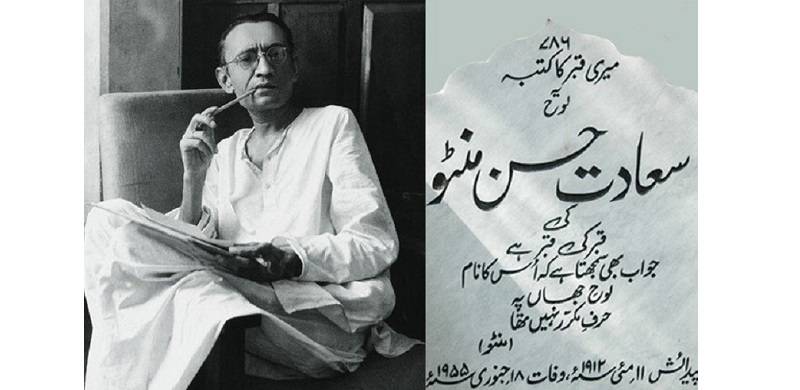
The master writer, arguably one of the most magnificent of his era, Saadat Hasan Manto was born in Ludhiana. He produced a collection of 22 short stories, a novel, five series of radio plays, three collections of essays and two collections of personal sketches. His stories are very popular all around the world. Dramas and plays have been performed on his writings. He is particularly known for the stories that he wrote after the 1947 Partition of the Indian Subcontinent, which were both loved and attacked in Pakistan.
Before becoming the writer that we know him as, he used to translate the works of Victor Hugo and other literature into Urdu. One day, his great friend Bari, after seeing his great writing skills, asked him to write his own works. From here began the journey of one of the most important writers of the twentieth century. His works were known for featuring the harsh reality of life for the general public. He portrayed the dark side of society and circumstances which were never examined or featured in the work of other writers. Manto once said:
“Logo ko Mujh se ye shikayat hai k mujhy bury loog hi ku pasand hein”
(People complain to me as to why it is that I like only bad people)
Famous plays by Manto include Toba Tek Singh, while his short stories or afsanas are part of student’s college curriculum too. Bitter Fruit is one of the finest collections of his writings and it includes biographies, quotes etc which are translated in English and well received by the reading public. Other popular stories of Manto include Thanda Gosht, Jhumkay and Lihaaf.
On the 18th of January 2005, the 50th commemoration of his demise, Manto was commemorated on a Pakistani postage stamp. On the 14th of August 2012, which is Pakistan's Independence Day, Saadat Hasan Manto was posthumously granted the Nishan-e-Imtiaz by the Government of Pakistan. In 2015, Pakistani actor Sarmad Khoosat made the film Manto. In 2018 a film on Manto by Indian director Nandita Das was released.
His personal life was a difficult one – with his drinking problem being a recurring source of problems. Manto died because of cirrhosis of the liver and was buried in Lahore.
Saadat Hasan Manto has left an imprint on the consciousness of the general public. His elegant prose draws the reader again and again, even to the same work. Manto once rightly said: “[...].and it is also possible that Saadat Hasan dies, but Manto remains alive.”
Before becoming the writer that we know him as, he used to translate the works of Victor Hugo and other literature into Urdu. One day, his great friend Bari, after seeing his great writing skills, asked him to write his own works. From here began the journey of one of the most important writers of the twentieth century. His works were known for featuring the harsh reality of life for the general public. He portrayed the dark side of society and circumstances which were never examined or featured in the work of other writers. Manto once said:
“Logo ko Mujh se ye shikayat hai k mujhy bury loog hi ku pasand hein”
(People complain to me as to why it is that I like only bad people)
Famous plays by Manto include Toba Tek Singh, while his short stories or afsanas are part of student’s college curriculum too. Bitter Fruit is one of the finest collections of his writings and it includes biographies, quotes etc which are translated in English and well received by the reading public. Other popular stories of Manto include Thanda Gosht, Jhumkay and Lihaaf.
On the 18th of January 2005, the 50th commemoration of his demise, Manto was commemorated on a Pakistani postage stamp. On the 14th of August 2012, which is Pakistan's Independence Day, Saadat Hasan Manto was posthumously granted the Nishan-e-Imtiaz by the Government of Pakistan. In 2015, Pakistani actor Sarmad Khoosat made the film Manto. In 2018 a film on Manto by Indian director Nandita Das was released.
His personal life was a difficult one – with his drinking problem being a recurring source of problems. Manto died because of cirrhosis of the liver and was buried in Lahore.
Saadat Hasan Manto has left an imprint on the consciousness of the general public. His elegant prose draws the reader again and again, even to the same work. Manto once rightly said: “[...].and it is also possible that Saadat Hasan dies, but Manto remains alive.”
